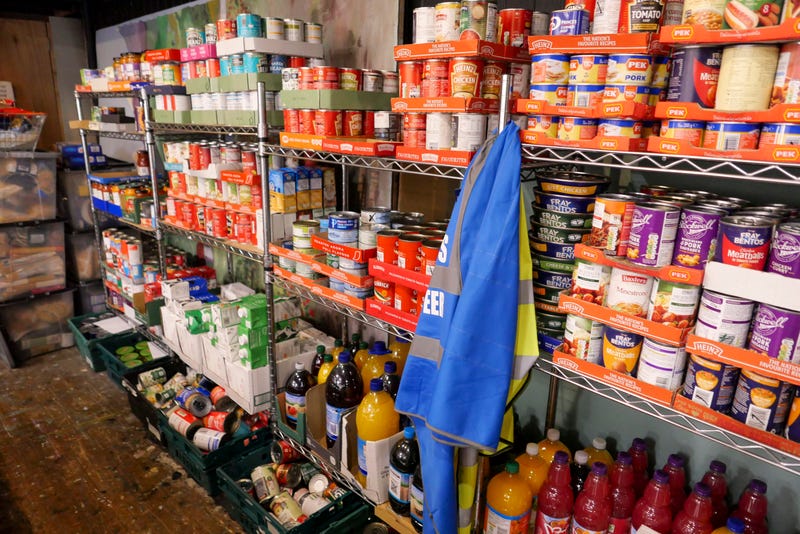
On the day California and 20 other states sued the federal government for failing to fund November food benefits, L.A. Care Health Plan announced Tuesday it was committing $5.4 million to support Los Angeles County food banks, while community organizations announced plans for a collection drive to support local residents in need.
Want to get caught up on what's happening in SoCal every weekday afternoon? Click to follow The L.A. Local wherever you get podcasts.
Due to the federal government shutdown, CalFresh benefits are expected to be delayed in November, impacting millions of people across the state, including nearly 1.5 million in Los Angeles County and more than 310,000 in Orange County.
CalFresh is the California version of the federal food assistance program also known as the Supplemental Nutrition Assistance Program, commonly referred to as EBT or food stamps. The program is entirely federally funded, but is managed by states and administered by counties.
In light of the benefits delay, L.A. Care Health Plan, billed as the nation's largest publicly operated health plan, announced Tuesday it was providing $5.4 million to help provide food for impacted families. Of that amount, $5 million will go to the Los Angeles Regional Food Bank, YMCA of Metropolitan Los Angeles and Food Forward. The funding is expected to support 10,000 to 15,000 households in the county each week in November, according to the Health Plan.
The additional $400,000 will go toward advancing food security efforts and bolstering food distribution efforts in the county.
"We know that good health starts with access to nutritious food," Martha Santana-Chin, CEO of L.A. Care, said in a statement. "Many of our members and their communities are facing real hardship right now, and we're grateful to be able to offer help when it's needed most -- because no one should have to choose between paying your bills and putting food on the table."
Meanwhile, several community organizations collectively known as the Los Angeles Interfaith Coalition for Hope and Justice on Tuesday announced an emergency "S.O.S. -- Save Our Selves" food and supply drive to support those impacted by the lapse in benefits. The effort will mobilize churches, mosques, synagogues and community centers across Los Angeles to provide food, diapers and other supplies to families in need.
Donations will be collected at multiple locations, and a central distribution center will be established at True LA Church at 1254 W. Manchester Ave., and 2nd Call, 5110 Obama Blvd.
"This is not about politics, it's about people," Cheryl Branch, CEO of Los Angeles Metropolitan Churches, said in a statement. "We refuse to stand by while thousands of Los Angeles families face hunger because of government dysfunction."
The suspension of benefit funding is expected to impact about 42 million Americans, including 5.5 million in California, according to the state. More than 63% of California's SNAP participants are children or elderly.
The Los Angeles County Department of Public Social Services has already been reaching out to CalFresh recipients to ensure they are aware of the situation and urging people with immediate needs to contact local food banks.
Orange County officials urged CalFresh recipients to call 211 or visit 211oc.org to learn about food, housing and utility resources. They also urged recipients to keep meeting all of the program's reporting requirements to ensure their benefits resume quickly when the shutdown ends.
The state of California joined about 20 other states on Tuesday in suing the federal government, calling on it to dip into an estimated $6 billion U.S. Department of Agriculture reserve fund designed to maintain food assistance in emergency situations -- such as a government shutdown, according to the governor's office.
"November SNAP benefits can and must be provided, even with the government shutdown," state Attorney General Rob Bonta said in a statement.
"USDA not only has authority to use contingency funds, it has a legal duty to spend all available dollars to fund SNAP benefits."
Gov. Gavin Newsom last week deployed the California National Guard to the state's food banks to assist, as well as fast-tracking $80 million in state funds to help alleviate the crisis.
In a social media post last week, Brooke Rollins, the U.S. Secretary of Agriculture, blamed Democrats for the government shutdown and suspension of SNAP benefits.
"Because of the Democrat shutdown, there are not enough funds to provide SNAP for 40 million Americans come Nov. 1," Rollins posted on X. "Democrats are putting free health care for illegal aliens and their political agenda ahead of food security for American families. Shameful."
According to the Center on Budget and Policy Priorities, SNAP has a contingency fund of about $6 billion, more than $5 billion of which should be available for use toward SNAP benefits, covering a large portion of the roughly $8 billion due in November.
The USDA head can also move funds among different nutrition programs, which it did earlier this month, transferring $300 million in tariff revenue to the Special Supplemental Nutrition Program for Women, Infants and Children (also known as WIC).
Democrats and Republicans blame each other for the government shutdown, with Democrats refusing to vote on a budget bill without an extension of subsidies under the Affordable Care Act to keep health care premiums down.
But Republicans refuse to budge on the matter, saying the health care issue can be debated later since the health care subsidies are in place until the end of the year.
Follow KNX News 97.1 FM
